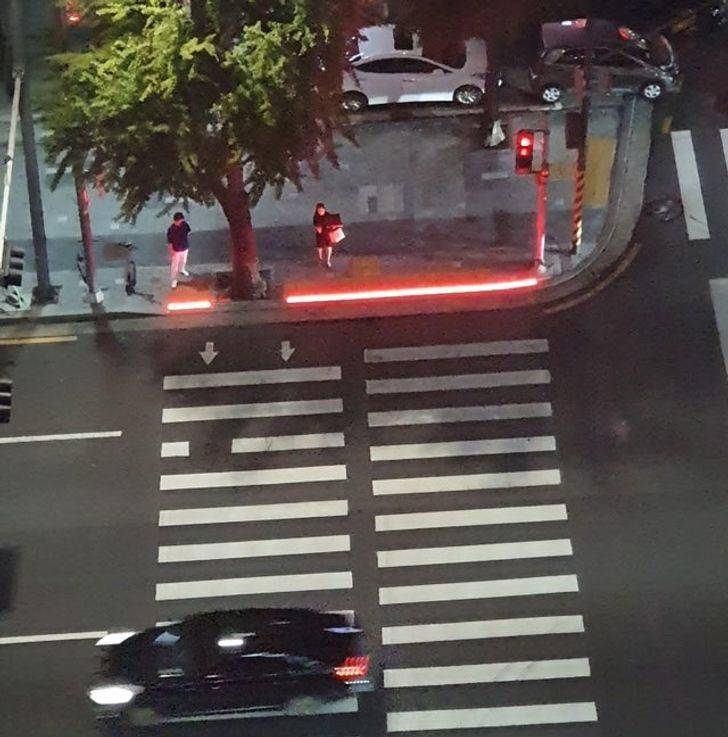4.

Levicy 4 year s ago
from Washington Post,
“No, blind people aren’t riding scooters. They do, however, need to know how to contact the scooter companies when they encounter the devices, which present a hazard when left lying around.
“We may not ride it, but if we trip over it, we can read the Braille on it and find out who to report it to,” said Shawn Callaway, president of the D.C. Chapter of the National Federation of the Blind. “We want the Braille on them to identify the company and their contact information.”
“These dockless bikes and scooters have not been a friend of the blind community. They are hazardous. People leave them in the middle of the sidewalk, so it is quite dangerous,” he said. “It’s all about inclusion and safety.”
“No, blind people aren’t riding scooters. They do, however, need to know how to contact the scooter companies when they encounter the devices, which present a hazard when left lying around.
“We may not ride it, but if we trip over it, we can read the Braille on it and find out who to report it to,” said Shawn Callaway, president of the D.C. Chapter of the National Federation of the Blind. “We want the Braille on them to identify the company and their contact information.”
“These dockless bikes and scooters have not been a friend of the blind community. They are hazardous. People leave them in the middle of the sidewalk, so it is quite dangerous,” he said. “It’s all about inclusion and safety.”
6.

Sandy 4 year s ago
#44
So, instead of using taxpayer funds on things that would be of actual benefit to wheelchair users, like wheelchair-ramps, accessible public bathrooms, wheelchair-friendly sidewalks, accessible water fountains and accessible public bathrooms they came up with a way to modify existing benches in a way that prevents the homeless from sleeping on said benches... What a coincidence.
So, instead of using taxpayer funds on things that would be of actual benefit to wheelchair users, like wheelchair-ramps, accessible public bathrooms, wheelchair-friendly sidewalks, accessible water fountains and accessible public bathrooms they came up with a way to modify existing benches in a way that prevents the homeless from sleeping on said benches... What a coincidence.
9.

Rhodella 4 year s ago
Sandy,
That's quite a leap to go from a single bench that allows wheelchair users to sit with their friends to saying the city doesn't also spend money on ramps, etc. I don't see how you can make that extrapolation. In my opinion it says just the opposite, I would bet that this city spends funding on ramps, etc. as well.
That's quite a leap to go from a single bench that allows wheelchair users to sit with their friends to saying the city doesn't also spend money on ramps, etc. I don't see how you can make that extrapolation. In my opinion it says just the opposite, I would bet that this city spends funding on ramps, etc. as well.
13.

Penny 4 year s ago
Debby, From another commenter:
from Washington Post,
“No, blind people aren’t riding scooters. They do, however, need to know how to contact the scooter companies when they encounter the devices, which present a hazard when left lying around.
“We may not ride it, but if we trip over it, we can read the Braille on it and find out who to report it to,” said Shawn Callaway, president of the D.C. Chapter of the National Federation of the Blind. “We want the Braille on them to identify the company and their contact information.”
“These dockless bikes and scooters have not been a friend of the blind community. They are hazardous. People leave them in the middle of the sidewalk, so it is quite dangerous,” he said. “It’s all about inclusion and safety.”
from Washington Post,
“No, blind people aren’t riding scooters. They do, however, need to know how to contact the scooter companies when they encounter the devices, which present a hazard when left lying around.
“We may not ride it, but if we trip over it, we can read the Braille on it and find out who to report it to,” said Shawn Callaway, president of the D.C. Chapter of the National Federation of the Blind. “We want the Braille on them to identify the company and their contact information.”
“These dockless bikes and scooters have not been a friend of the blind community. They are hazardous. People leave them in the middle of the sidewalk, so it is quite dangerous,” he said. “It’s all about inclusion and safety.”













https://www.washingtonpost.com/transportation/2019/08/22/why-is-there-braille-me
ssage-my-e-scooter/
“No, blind people aren’t riding scooters. They do, however, need to know how to contact the scooter companies when they encounter the devices, which present a hazard when left lying around.
“We may not ride it, but if we trip over it, we can read the Braille on it and find out who to report it to,” said Shawn Callaway, president of the D.C. Chapter of the National Federation of the Blind. “We want the Braille on them to identify the company and their contact information.”
“These dockless bikes and scooters have not been a friend of the blind community. They are hazardous. People leave them in the middle of the sidewalk, so it is quite dangerous,” he said. “It’s all about inclusion and safety.”
So, instead of using taxpayer funds on things that would be of actual benefit to wheelchair users, like wheelchair-ramps, accessible public bathrooms, wheelchair-friendly sidewalks, accessible water fountains and accessible public bathrooms they came up with a way to modify existing benches in a way that prevents the homeless from sleeping on said benches... What a coincidence.
Spreading joy, where'er you go.
Yes.
What's your point?
That's quite a leap to go from a single bench that allows wheelchair users to sit with their friends to saying the city doesn't also spend money on ramps, etc. I don't see how you can make that extrapolation. In my opinion it says just the opposite, I would bet that this city spends funding on ramps, etc. as well.
#7 in Germany you ll get that for free
#30 shshzt the fzck up and take my money
#3 unless the cover is recyclable....
Would someone who cannot read an usual manual drive an electric scooter?
from Washington Post,
“No, blind people aren’t riding scooters. They do, however, need to know how to contact the scooter companies when they encounter the devices, which present a hazard when left lying around.
“We may not ride it, but if we trip over it, we can read the Braille on it and find out who to report it to,” said Shawn Callaway, president of the D.C. Chapter of the National Federation of the Blind. “We want the Braille on them to identify the company and their contact information.”
“These dockless bikes and scooters have not been a friend of the blind community. They are hazardous. People leave them in the middle of the sidewalk, so it is quite dangerous,” he said. “It’s all about inclusion and safety.”
#43 why? people are all shapes and sizes but we keep setting up graphs and lines and chairs to some arbitrary standards to make life only marginally more efficient
#43, chair sizes, desk heights, etc. are built based on human factors, what size would fit a majority of the population. These are not arbitrary standards but are international standards developed through research.